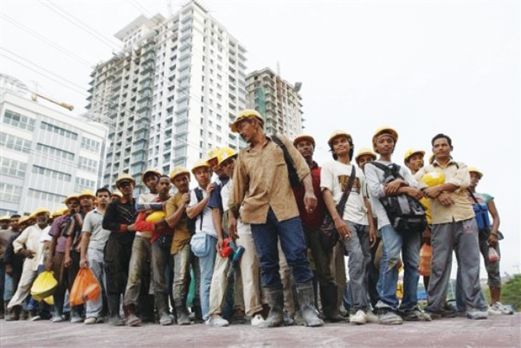
THIS is earth-shattering: the number of foreign workers in Malaysia is so huge that they outnumber the capacity crowd at the Malaysia Cup football final at the National Stadium in Bukit Jalil recently by a whopping 67 times. Yes, super colossal — a quarter of the country’s entire population.
And, that petrifying figure came last week from no less than Human Resources Minister Datuk Richard Riot when he said there was an estimated 6.7 million immigrant workers in the country, including those who were here illegally. All this while we have only been guessing but this is the first time it came from a person in authority — a minister at that. And, it is alarming.
If 6.7 million foreign workers don’t mean a thing and there is still no sense of perspective, how about this — the number is 25 times more than the population of Perlis, three times more than the total number of Malaysians of Indian origin and about the same size as the current Chinese population in the country. The number is so huge that it is even bigger than the population of the whole of Malaya when it gained independence in 1957 (6.3 million).
That’s how huge it is. And, at the risk of being labelled xenophobic, we ought to take notice.
Bernama quoted Riot as saying Malaysians should not take lightly the influx as the foreign workers might be able to control the country’s economy if continued to be given the opportunity. He said the matter should be viewed seriously as only 2.1 million of them had valid work permits.
“The actual number of foreign workers in this country may be bigger based on the premise that a foreign worker with a valid work permit would bring in at least another without a permit. At the moment, foreign migrant workers may be monopolising the semi-skilled jobs in certain sectors like agriculture and construction, but who knows? One day they may monopolise jobs in the professional field,” he said.
The news somehow did not receive the play-up it deserved, probably due to the breaking of other stories considered more important. Though the revelation did not really come as a surprise to most, it did, however, confirm our deepest suspicion that the number of immigrant workers here has always been understated. With that, in terms of significance, it should easily be the story of the week.
We are clearly overwhelmed by the presence of these foreigners especially if you live in the major towns or the big plantations. And it is not just because of the sheer size of the crowd when they converge in certain parts of the city on long festive holidays. On most occasions they have unconsciously become very much a part of our daily lives.
Take a typical day: you start by going to the fish market and the person you deal with will most likely be a foreigner. Then you continue with a nasi lemak breakfast and chances are the person serving you is another foreigner. On the way to work you stop at the petrol station to fill up. Though it is mainly self-service at the pump, attendants are still around to lend a hand and they would strike a conversation Isi penuh ka, saya kasi tolong. At work, the cleaning lady is so thorough she has to be mopping the men’s toilet at a time when you need to use it. She is a foreigner. Tidak apa, Pak. At lunch, unless you bring food from home or choose to buy straight from a fast-food counter, you would in all probability be served by a foreign waiter whether it is at a kopitiam or a mamak restaurant. He brings you teh halia instead of the teh o halia you had ordered and gives a blank look when you start to protest. Yah, teh halia, he says, complete with flexible head moves.
After work you decide to have a haircut at the neighbourhood Indian barber shop. Again the foreigner comes to serve you. You tell him to trim the sides and the back and he finishes it off by giving you a crew cut. Ini sudah kasi pendek, he would mutter almost nonchalantly.
In the evening you need someone to repair a faulty home appliance and you call a number. A foreigner would come a-calling. You have a dinner appointment at a restaurant located in a major shopping centre. You drive there and at the parking lot, security men direct you in an accent that is surely foreign.
The point I am trying to make is that our lives are unconsciously governed by foreigners making a living here. Almost all of them are either unskilled or semi-skilled workers. Malaysia is fast becoming like some of the countries in the Middle East where the foreigners rule. Without the slightest dash of xenophobia, that’s not good.
Take a simple calculation. If each remits RM1,000 back home, Malaysia stands to lose RM6.7 billion per month.
The minister has spoken. But why did we come to this and what is being done now to address the issue?
source:::http://www.nst.com.my
No comments:
Post a Comment